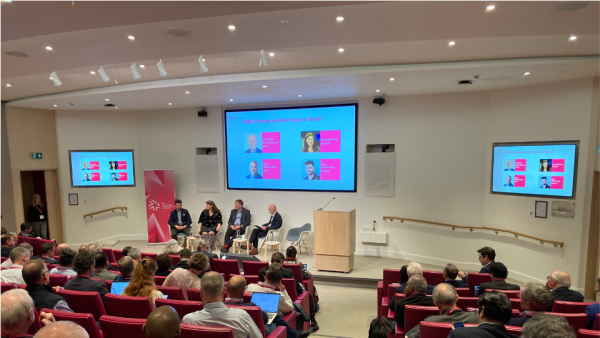
The UKTIN Strategic Groups bring together academic and industry leaders and experts, governmental and regulatory specialists, and representative bodies to cohesively communicate the needs of the broader ecosystem and propose a shared public and private sector strategic vision for UK telecoms.
Read the Strategic Working Group Report: Future Networks here
UKTIN spoke to Professor Maziar Nekovee, Chair of The Academic Future Networks Strategic Group to learn more.
Please explain the role and remit of the academic group.
The group was established to provide strategic direction and thought leadership in advancing the UK’s research and innovation in future networks. Our role is to help create technology roadmaps with a time horizon of 2030 and beyond, aligning with academic research priorities and the future needs of society and industry.
We aim to help identify which areas of future networks the UK is leading in, and where it is most aligned with the industry. As a part of UKTIN, the team hopes to act as a bridge between the UK academic research community, funding bodies and industry stakeholders, facilitating collaboration and addressing key trends and challenges in emerging and future network technologies. We also intend to identify gaps in university education, fostering the next generation of network innovators and engineers.
Please talk us through the process of creating the paper.
It was a collaborative effort, bringing together senior and early-career academic experts across the spectrum of technologies to capture the UK’s diverse academic perspectives on future networks. We gathered insights from stakeholders on key UK and global initiatives and identified areas of research strengths, gaps, as well as future needs. Regular workshops and roundtable discussions – and at times, heated debates! – helped to refine our ideas and ensure that the paper remained relevant and reflected inputs from the widest possible academic community. Then, UKTIN put us through a rigorous review process which helped to inform and enrich the paper. The Expert Working Groups had a big impact on the broader outlook and general findings.
Who will the paper be of interest to?
While the paper has academic rigour and focus, it is also of significant interest to the industry: one of its key goals is to bridge the gap between academic research and future industry needs.
The insights and recommendations we provide are directly applicable to the development of next-generation network technologies, which are crucial for the industry’s growth and competitiveness. For example, we believe that telecommunications companies, network operators, technology firms and SMEs can use the findings to inform their R&D strategies, while policymakers can refer to it when designing frameworks that support innovation. It also can serve as a roadmap for industry-academia collaboration, which is vital for bringing research innovations to market.
What is the one thing you’d like people to know about the paper?
Future network technologies will not only fundamentally reshape the telecom industry and economics but also, and perhaps even more radically, will transform society and the industry as a whole. This trend has already started in the 5G era, where communication networks are playing a key role in enabling digital transformation as well as the transition to Net Zero in sectors such as health, energy, and transportation. We plan to expand on this aspect in our next paper.
What surprised you most about the report?
The speed at which some of the cutting-edge technologies are evolving, particularly in areas like AI-driven 6G wireless networks and next-generation optical fibre communications. It became evident during the research process that many innovations we once considered futuristic are now on the cusp of becoming mainstream within the next decade. This rapid evolution of technology underscores the importance of staying ahead of the curve and continuously updating our research priorities and agenda.
What conclusions were you able to draw?
While there has been significant recent investment in the UK, to remain globally competitive and have a significant impact, there is a clear need for a long-term strategy and sustained investment in research and innovation in future networks. Having a funding model that supports and enables long-term research collaboration between academia, industry and SMEs is necessary to ensure that our world-leading academic research in future networks successfully translates into global telecommunication standards, large-scale technology trials, and early development of new IP and solutions by UK companies and university spin-offs.
The paper concludes that emerging technologies like AI, and quantum will be important to the evolution of future networks and that new mechanisms to promote interdisciplinary research collaboration, as well as future education, will be crucial to achieving breakthroughs in these areas.
It also highlights the need for strengthening global collaborations and new mechanisms to promote strategic collaboration between industry and academia, to ensure that the academic research carried out here in the UK has an international reach and impacts the development of global standards in future networks, such as IMT 2030.
Finally, we emphasise that sustainability and inclusivity must be prioritised in the development of future networks. These technologies will play a pivotal role in addressing global challenges, such as climate change and the digital divide, and we must ensure that technology is shaped in a way that their benefits are distributed equitably across different regions and populations. This is a theme, which we plan to further develop in our next paper.
Read the Strategic Working Group Report: Future Networks here









